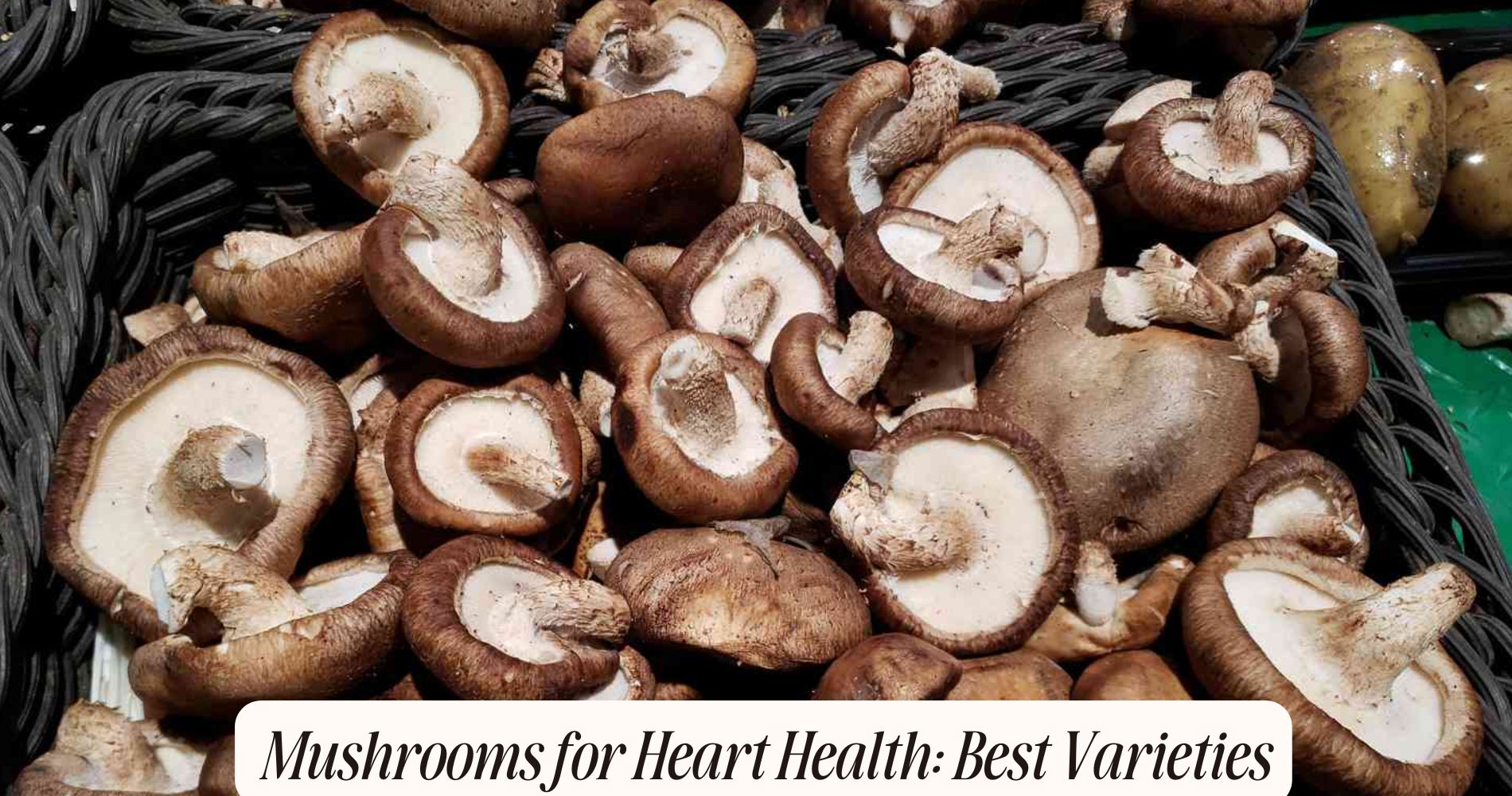
Are Mushrooms Good for Kidneys? The Facts
Nutritional Profile of Mushrooms
Mushrooms are a nutritional powerhouse, offering a unique blend of vitamins, minerals, and antioxidants that can benefit your overall health. Different mushroom varieties, such as shiitake, portobello, and cremini, boast varied nutrient content, making them versatile additions to your diet.
For instance, shiitake mushrooms are rich in B vitamins, particularly B5, which plays a significant role in energy metabolism. Portobello mushrooms are a fantastic source of potassium, essential for maintaining healthy blood pressure levels.
Meanwhile, cremini mushrooms provide a good dose of selenium, an antioxidant that helps protect your cells from damage. Mushrooms also contain fiber, which supports digestive health and helps maintain a healthy weight.

You'll find that many mushroom varieties are low in calories, making them an excellent option for those looking to manage their weight without sacrificing nutrition.
Furthermore, mushrooms are unique in their ability to produce vitamin D when exposed to sunlight, an essential nutrient for bone health. By incorporating a variety of mushrooms into your meals, you can enjoy their diverse nutrient profiles while enhancing the flavors of your favorite dishes.
Benefits of Mushrooms for Kidneys
Including a variety of mushrooms in your diet can offer notable benefits for kidney health. Different mushroom varieties, such as shiitake, maitake, and reishi, contain essential nutrients and antioxidants that support overall well-being. These compounds help reduce inflammation and oxidative stress, both of which can negatively impact kidney function.
Mushrooms are low in potassium, making them a great choice for those managing kidney issues. This characteristic allows you to enjoy their flavors without overloading on potassium, which is often restricted in kidney diets. Additionally, the fiber found in mushrooms aids digestion and can promote a healthy weight, reducing the strain on your kidneys.
Furthermore, certain mushroom varieties, like reishi, are known for their immune-boosting properties. A strong immune system can help your body fend off infections that may complicate kidney health.
Incorporating mushrooms into meals can also enhance your diet with their unique flavors and textures, making healthy eating more enjoyable.
Risks of Mushroom Consumption
While adding mushrooms to your diet can offer health benefits, it's important to watch out for potential risks associated with their consumption. One major concern is toxicity. Certain mushrooms are highly toxic and can lead to severe health issues or even death if ingested.
It's essential to differentiate between edible and poisonous varieties, as some look remarkably similar. Always source your mushrooms from reputable suppliers to minimize toxicity concerns.
Another risk involves allergic reactions. Some people may be sensitive or allergic to specific mushroom types, experiencing symptoms like skin rashes, gastrointestinal distress, or respiratory issues.

If you've never eaten mushrooms before, it's wise to start with a small amount and monitor your body's response.
Additionally, mushrooms can accumulate heavy metals and other toxins from the environment. If you consume wild mushrooms, be cautious, as their safety can vary based on where they were harvested.
Types of Mushrooms to Consider
When considering mushrooms for your diet, it's crucial to focus on their nutritional benefits and safety for your kidneys.
Certain varieties, like shiitake and portobello, offer valuable nutrients while being gentle on kidney function.
Nutritional Benefits of Mushrooms
Exploring the world of mushrooms reveals a diverse array of types, each offering unique nutritional benefits that can enhance your diet and support kidney health. Among the popular mushroom varieties, shiitake, portobello, and oyster mushrooms stand out for their health benefits.
Shiitake mushrooms are rich in polysaccharides, which can boost your immune system and may have anti-inflammatory properties.
Portobello mushrooms, low in calories and high in fiber, are excellent for digestion, making them a great addition to a kidney-friendly diet. They also provide essential nutrients like potassium, which can help maintain heart health.
Oyster mushrooms are another fantastic choice; they contain antioxidants that combat oxidative stress and support overall health. Additionally, these mushrooms are high in B vitamins, vital for energy metabolism and brain function.
Incorporating these mushroom varieties into your meals can't only elevate your culinary experience but also provide significant nutritional advantages.
Safe Varieties for Kidneys
Choosing the right mushrooms can play an important role in supporting kidney health. Some mushroom varieties offer specific benefits that may help your kidneys function better. For instance, shiitake mushrooms are rich in antioxidants and can help reduce inflammation, which is critical for maintaining overall kidney health.
Another excellent choice is maitake mushrooms. They may assist in regulating blood sugar levels and improving insulin sensitivity, factors that are essential for preventing kidney damage, especially in individuals with diabetes.

Portobello mushrooms are also a good option; they're low in potassium, making them safer for those on a renal diet.
Additionally, white button mushrooms are widely available and can be a versatile addition to your meals. They contain important nutrients, including B vitamins, which are important for overall health.
However, it's best to avoid wild mushroom varieties unless you're certain they're safe, as some can pose risks to your kidneys.
Incorporating these safe mushroom varieties into your diet can contribute positively to your kidney health, providing important nutrients while minimizing potential risks.
Always consult with your healthcare provider before making significant dietary changes, especially if you have existing kidney conditions.
How to Incorporate Mushrooms
Incorporating mushrooms into your meals can be both delicious and nutritious.
You can experiment with various cooking methods, like sautéing or roasting, to enhance their flavor and texture.
Plus, there are countless recipe ideas that can make mushrooms a family favorite while supporting kidney health.
Cooking Methods to Try
Often, people underestimate the versatility of mushrooms in cooking, but they can easily elevate a dish with their earthy flavors and unique textures. To make the most of mushrooms, consider trying different cooking methods that highlight their qualities.
For example, sautéed varieties like shiitake or cremini can bring a rich, umami taste to your meals. Simply heat a pan with a bit of oil, add sliced mushrooms, and cook until they're golden brown.
Grilled options are another fantastic way to enjoy mushrooms, particularly portobello caps. Marinate them in your favorite herbs and spices, then grill until they're tender and smoky. This not only enhances their flavor but also adds a delightful char.
You can also incorporate mushrooms into soups or stews, where they can absorb flavors and add depth to the broth.
Don't forget about using them in stir-fries, where sautéed varieties can complement vegetables and proteins beautifully. By experimenting with various cooking techniques, you'll discover how mushrooms can enrich your dishes while also potentially benefiting your kidney health.
Recipe Ideas for Families
Families looking to enhance their meals can easily include mushrooms in a variety of delicious recipes. These versatile ingredients not only add flavor but also boost nutrition.
For a simple start, consider mushroom stir-fry. Just sauté sliced mushrooms with colorful bell peppers and broccoli, then serve over brown rice or quinoa for a wholesome dinner.
For family-friendly recipes, try mushroom pizza. Use whole wheat dough, add your favorite tomato sauce, and top it with mushrooms, cheese, and veggies. It's a fun way to involve the kids in meal prep while making a healthier version of a classic dish.
Another great option is a mushroom and spinach omelet for breakfast. Whisk eggs, add sautéed mushrooms and fresh spinach, and cook until fluffy. This quick meal is packed with nutrients and keeps everyone satisfied.
Incorporating mushrooms into your meals doesn't have to be complicated. You can even use them in soups or sauces for added depth.
With a little creativity in your mushroom meal prep, you'll find that these tasty fungi can transform ordinary dishes into family favorites while supporting kidney health.
Expert Opinions on Mushrooms
While many health enthusiasts tout the benefits of mushrooms, expert opinions on their effects, particularly concerning kidney health, vary considerably.
Some nutritionists highlight the potential health benefits of various mushroom varieties, citing their high antioxidant content and anti-inflammatory properties. These factors can contribute to overall health, which is essential for kidney function.
However, other experts caution against excessive consumption of certain mushroom types, especially for individuals with pre-existing kidney conditions. For instance, some mushrooms contain compounds that may increase potassium levels, potentially leading to complications for those on a kidney-restricted diet.

You might also encounter differing views on the role of mushrooms in a balanced diet. While they can be a great source of vitamins and minerals, their specific impact on kidney health remains unclear.
Some dietitians suggest moderation, emphasizing the importance of a diverse diet to guarantee you receive a full spectrum of nutrients.
Frequently Asked Questions
Can Mushrooms Help With Kidney Stones Prevention?
Mushrooms, particularly certain varieties, contribute to kidney nutrition, potentially aiding in kidney stone prevention. Their high water content and nutrients support overall kidney health, but it's crucial to maintain a balanced diet for ideal results.
Are There Any Mushrooms to Avoid for Kidney Health?
You should be cautious with certain mushroom types if you're concerned about kidney function. Some wild mushrooms, like Amanita, can be toxic. Always consult a healthcare professional before adding new mushrooms to your diet for kidney health.
Do Mushrooms Interact With Kidney Medications?
Mushroom varieties can potentially affect medication absorption, so it's crucial to discuss any dietary changes with your healthcare provider. They can guide you on safe consumption while managing your kidney medications effectively.
How Often Should I Eat Mushrooms for Kidney Benefits?
You should aim to eat a variety of mushrooms regularly—like shiitake, maitake, and portobello—to reap kidney nutrients. Incorporating them into your diet two to three times a week can enhance overall health benefits.
Are Wild Mushrooms Safe for Kidney Health?
Wild mushrooms can be safe for your kidney health if you're aware of the mushroom varieties you consume. Some may support kidney function, while others could be harmful. Always research before trying unfamiliar types.
Conclusion
Incorporating mushrooms into your diet can offer several benefits for kidney health, thanks to their rich nutritional profile. However, it's essential to be aware of potential risks, especially if you have existing kidney issues. Choosing the right types of mushrooms and preparing them properly can enhance their benefits. Always consult with a healthcare professional before making significant dietary changes, ensuring that your choices align with your individual health needs and conditions.




